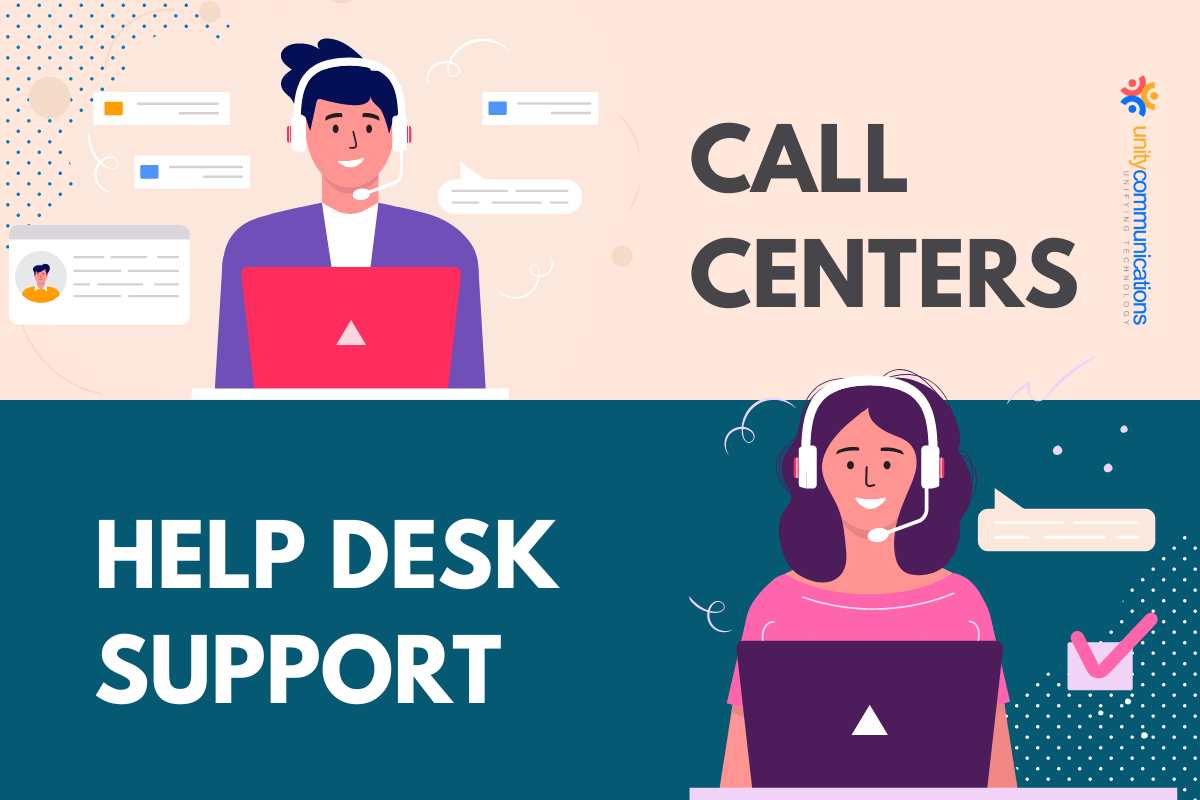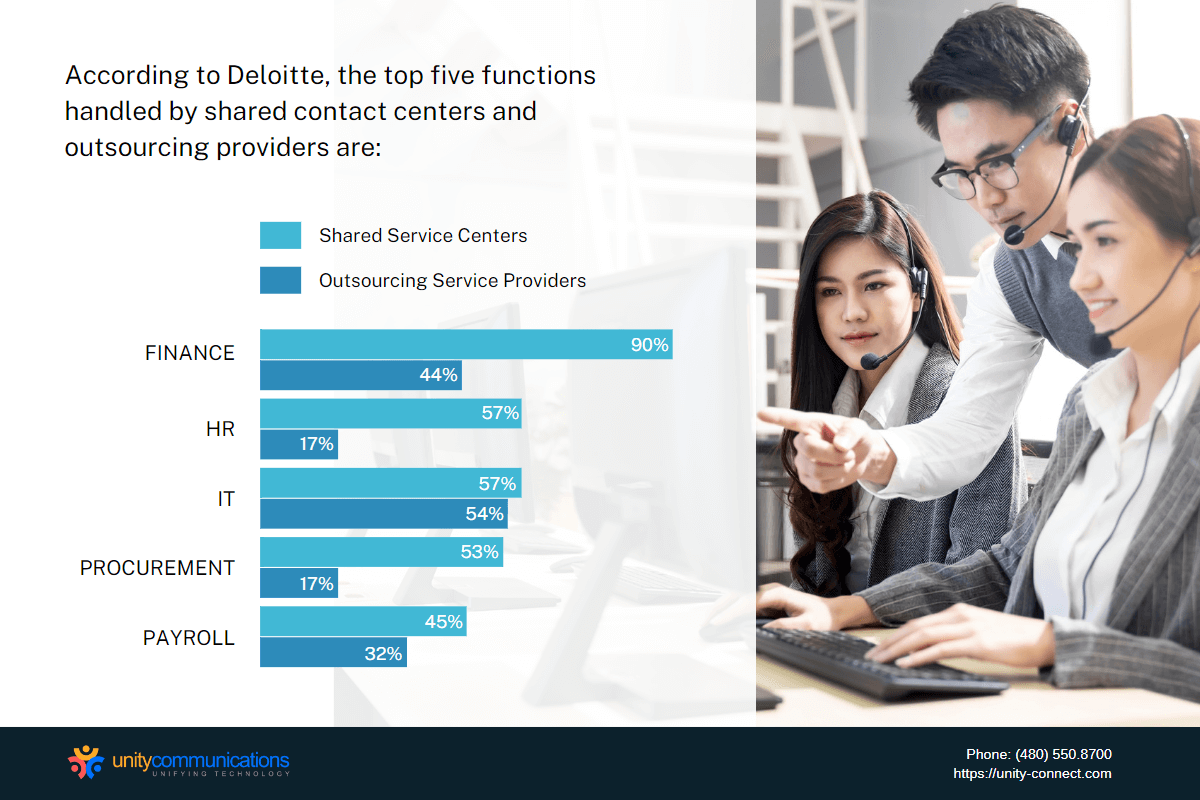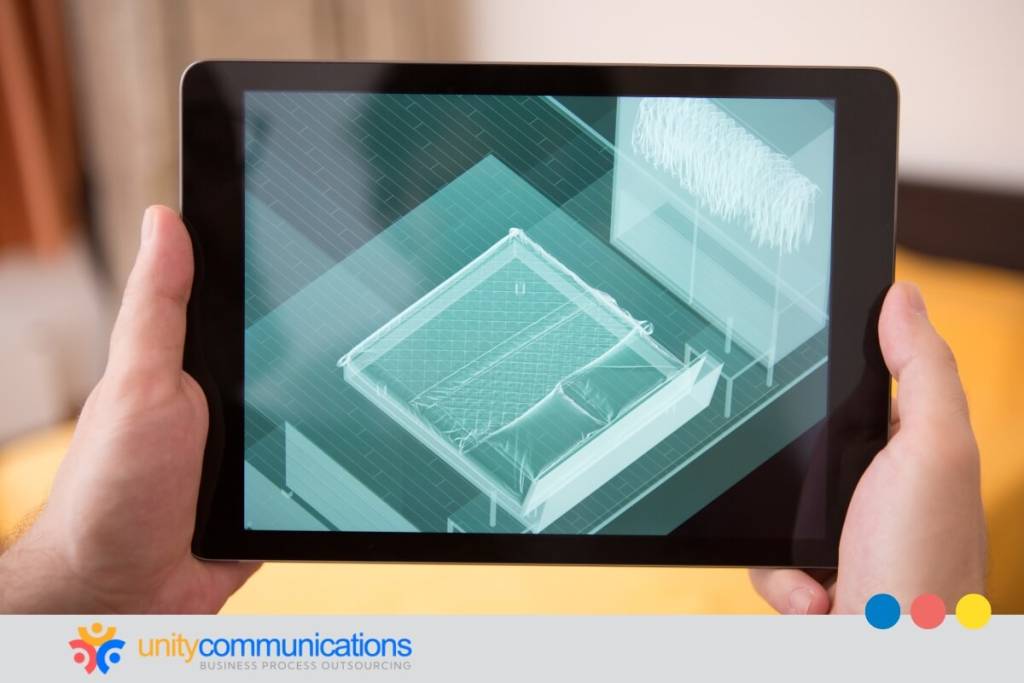Table of Contents
When you hear the word “outsourcing,” what comes to mind? Do you picture agents taking phone calls and assisting customers?
People usually associate outsourcing with a call center or a help desk. Indeed, both are vital to business, whether customer service contact centers or outsourced technical support. The absence of one or the other can cripple your business.
But are these two the same? Not necessarily.
This page will help guide you as you consider outsourcing services. Learn the differences between call centers and outsourced help-desk support.
Call Centers vs. Outsourced Help-desk Support

Front-office and back-office outsourcing let you choose between a call center or help-desk support. But before deciding between the two, let’s look at their basic definitions:
- Call Center: This service handles customer concerns and provides support via phone calls. Call center representatives either receive incoming calls (inbound) or make outgoing calls (outbound). They usually answer questions, process requests, engage in sales, and conduct market research.
- Outsourced Help-desk Support: This service provides IT or technical support via different channels. Contractor IT specialists troubleshoot technical issues such as website glitches, software problems, and hardware malfunctions. An IT service provider usually handles this business function.
10 Key Differences Between Call Centers and Outsourced Help-desk Support
Let’s get down to the nitty-gritty so that you can make an informed outsourcing decision.
Take a look at the table below showing the key differences between call centers and outsourced help-desk support.
Key Difference | Call Center | Outsourced Help Desk |
| Work scope | Handles front-office tasks | Handles both front- and back-office tasks |
| Business functions | Covers different business functions | Usually focuses on IT or tech support |
| Issue types | Covers almost all customer issues | Focuses on technical issues |
| Channels | Provides only one channel: phone service | Offers phone service, live chat, email support, social media, and self-service options |
| Industry Types | Caters to businesses across various industries | Serves the IT industry |
| Workforce | Hires people with soft skills and requires them to undergo process/product training | Hires talent with technical expertise and train them to develop hard skills |
| Technology | Needs a robust phone system and internet connectivity | Invests in digital tools and technologies for IT support enhancement |
| Service Recipients | Serves customers and clients | Caters to end users, whether employees or customers |
| Service Provider | Business process outsourcing (BPO) service providers with contact centers | IT service providers |
| Outsourcing Service | Focuses on knowledge process outsourcing (KPO) | Focuses on IT-enabled services (ITES) |
Now, let’s dig deeper into each key difference.
1. Scope of Work
To determine the difference between a call center and an outsourced help desk, consider their work scope.
A call center usually deals with front-office tasks. Meanwhile, an outsourced help desk includes both front- and back-office outsourcing services.
Call center representatives (CSR) perform customer-facing tasks such as customer service, sales, and technical support. They usually interact with potential and regular customers over the phone.
As the name suggests, a call center makes or receives phone calls. The call classifications are as follows:
- Inbound is when representatives receive calls and assist customers over the phone
- Outbound involves calling potential customers to sell products or offer services
- Blended is when representatives handle both incoming and outgoing calls
On the other hand, an outsourced help desk doesn’t only handle front-office tasks; it also provides customer support through back-office functions.
An example of back-office work is IT support. Help-desk representatives also create tickets and escalate more complex issues to higher-tier IT personnel. Back-office representatives work behind the scenes to resolve customers’ technical issues.
2. Business Functions
Call centers and outsourced help desks also differ in specific functions they handle.
A call center handles various functions. However, a help desk usually focuses on IT and technical support.
Business functions call centers usually handle include:
- Customer service: Representatives assist customers in many ways. They answer questions, give updates, process requests, handle complaints, and more.
- Technical support: Specialists provide users with technical assistance. They troubleshoot and fix computers, mobile phones, and other electronic devices.
- Sales: Telemarketers contact prospective customers to offer products or services.
- Order processing: Customers call to place orders, and representatives process them.
- Market research: Researchers contact various organizations to gather data for research purposes.
Some business functions outsourced help-desk support covers are:
- IT or technical support: A help desk provides technical assistance to technology users. End users are either employees or customers.
- Single point of contact (SPOC): A help desk acts as a SPOC for all technical issues and concerns encountered by employees and customers.
- Ticket creation and management: The SPOC doesn’t necessarily resolve problems immediately. Representatives create and manage tickets escalated to the proper departments.
- Software and hardware troubleshooting: Specialists handle device malfunctions and digital app problems. They assist end users by troubleshooting and fixing them.

Source: www.deloitte.com | 2021 Global Shared Services and Outsourcing Survey Report
Most external call centers provide the top five business functions listed above. However, outsourced help-desk support covers IT functions commonly outsourced as well.
3. Types of Issues
The outsourcing industry covers many business operations. Companies outsource data entry, finance, HR, customer service, sales, IT support, and more.
What does this mean? Outsourcing companies handle different types of issues. And that’s where the difference between call centers and outsourced help desks lies.
That said, a call center covers almost everything. However, an outsourced help desk focuses on technical assistance.
Some issues or concerns a call center usually handles include:
- Product or service questions
- Order processing and fulfillment
- Customer requests
- Billing and collections
- Complaints and disputes
- Updates and reports
- Sales or telemarketing
- Technical support
Some technical issues help-desk support handles are:
- Technology product defects
- Software problems
- Hardware malfunctions
- System errors
- Network issues
Based on the identifications, call centers have a vast scope of issues to handle. However, outsourced help-desk support is only limited to technical issues.
4. Service Channels
The most obvious difference between a call center and an outsourced help desk is their service channels.
A call center is limited to phone service. However, an outsourced help desk uses other channels.
The call center industry is booming. According to Hiver’s 2021 report, the phone is the most commonly used channel in customer service. The report reveals that 83% of customer service teams offer telephone support.
But an outsourced help desk uses other channels. The same Hiver report identifies other means of communication such as:
- Live chat (42%)
- Email support (77%)
- Social media (31%)
- Self-service options (25%)
- Support forums (16%)
The report also highlights that a vast majority of businesses are now providing multi-channel support. Specifically, almost 60% offer customer service via three or more communication means.
5. Types of Industry
Another difference between a call center and outsourced help-desk support is the industry types they service.
A call center serves various businesses across different industries. However, an outsourced help desk usually caters to the IT industry.
Also listed in the report as different industries that contact centers handle are:
- Banking, financial services, and insurance (BFSI)
- Consumer goods and retail
- Government
- Healthcare
- IT and telecom
- Travel and hospitality
- Others
However, an outsourced help desk serves largely the IT industry. Note, however, that almost all businesses now need a robust IT department. Thus, the global IT outsourcing segment might hit $395 billion this year. It might reach $587.30 billion by 2027 with an 8.26% CAGR. Indeed, an outsourced help desk is relevant to the industry.
6. Access to Workforce
The workforce is the most valuable asset in business. Whether you outsource data entry services or technical support, you need a highly reliable team.
However, there’s a difference in workforce access between a call center and an outsourced help desk. Take note of the following:
- Call center: Most contact centers hire people that meet minimum hiring requirements. They must have soft skills such as communication, customer service, and telemarketing. However, they don’t need to be well-versed with the products or services. Why? They usually undergo product or process training before hitting production.
- Outsourced Help-desk support: IT service providers are highly selective in choosing applicants. As much as possible, they hire those with technical know-how and skills. They only consider those with educational IT-related backgrounds, industry experience, and specialization.
7. Use of Technology
Another key difference between a call center and outsourced help-desk support is technological use.
A help desk is more technical. It caters to end users of technology products such as computers and mobile phones. It’s also a function handled by an IT department to ensure continuous operations. Hence, it must stay on top of its technological resources.
Meanwhile, a call center requires stable phone and internet connections. It must have the most advanced phone system to meet its objectives and perform its job.
But, in general, the outsourcing industry demands the latest technology and advanced resources. The same Deloitte report identified the top enablers for digital transformation.
- Robotic process automation (69%)
- Global standard processes (59%)
- Single-instance ERP (54%)
- Cloud services (51%)
- Service enablement for case management (47%)
Technological use is imperative for business digital transformation. Hence, contact centers and IT providers should keep up with the latest technology.
8. Service Recipients
Another major difference between a call center and a help desk is service recipients. Take note of the following.
- Call center: A third-party contact center usually caters to customers or clients. Inbound representatives receive phone calls and assist customers. Meanwhile, outbound representatives contact potential leads for telemarketing. In addition, some BPO call centers serve clients such as B2B companies.
- Outsourced help-desk support: An IT service provider usually caters to employees and customers. Both stakeholders are end users of technology products. They often confront technical challenges and need technical assistance. That’s where a help desk comes into the picture.
9. Service Provider
BPO service providers typically have call centers catering to various companies of all sizes. Meanwhile, IT service providers usually provide help-desk support.
- Call center: A company can have an in-house call center for customer service, sales, or marketing. However, most businesses prefer to outsource their operations to BPO service providers. That explains the expected global call center market value of $496 billion by 2027, with a 5.6% CAGR.
- Outsourced help desk: An outsourced IT provider is a third-party vendor that provides businesses with IT services such as help-desk support. Most companies outsource their help-desk operations to an IT provider to cut operating costs and free up time for their teams.
10. Outsourcing Service
The difference between a call center and an outsourced help desk boils down to outsourcing service.A call center usually offers:
- Knowledge process outsourcing (KPO): This service provides expertise and leverages industry knowledge. An outsourced call center with a team of specialists helps scale and grow your business.
Outsourced help-desk support typically provides:
- IT-enabled services (ITES) BPO: This covers IT functions such as a help desk. An IT service provider meets your stakeholders’ IT and technical needs.
The Bottom Line

Learning the differences between call centers and outsourced help-desk support is crucial. You should know the terminologies so that you can make better informed outsourcing decisions.
A call center handles your help-desk operations, but it also covers other business functions such as customer service or telemarketing. On the other hand, an outsourced help-desk service is best for IT functions and technical support.
That said, consider the ten key differences discussed above. They will help you decide the type of outsourcing to choose for your business.



